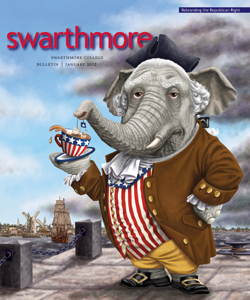Recommendations
Recommendation 1: Through structures and incentives that encourage innovation, Swarthmore should foster a curriculum of intellectual rigor and creativity that combines disciplinary strength and flexibility.
- Support teaching, learning, and research initiatives to cultivate traditional and new competencies and to support students who come to Swarthmore with a range of preparations.
- Provide high-impact learning experiences.
- Strengthen the infrastructure and mechanisms for helping students navigate the curriculum, discover opportunities, and manage their choices.
- Support curricular innovation, especially interdisciplinary teaching and programs, with helpful structures and additional faculty positions.
- Address facilities needs for academic programs.
Recommendation 2: Swarthmore should draw on its traditions and strengths as a community to serve as a model for purposeful communities in the 21st century.
- Develop a comprehensive diversity, inclusivity, and engagement plan that will transform the College into a model workplace and residential learning community in an increasingly complex global world.
Support the common good and civil discourse. - Invest in sustainable environmental practices, including minimizing greenhouse gas emissions from the College’s own operation and preserving the Crum Woods.
- Create a comprehensive approach to leadership development including a Center for Innovation and Leadership for students.
- Support athletics, including recreational, varsity, and club sports, and continue to address associated facilities needs.
- Develop a comprehensive wellness program for students and other members of the College community.
- Continue to recruit and support staff members whose contributions and devotion to the Swarthmore community makes a profound impact on our students and others.
- Protect and create common spaces to support our objectives for the community.
Recommendation 3: Swarthmore should continue to encourage and support faculty excellence, embracing exceptional teaching, active scholarship, and artistic production throughout an individual’s career.
- Recognize and support the traditional and new ways that faculty members teach.
- Recognize the value of faculty research and artistic production and support it vigorously.
- Renew efforts to increase the diversity of the faculty, especially in tenure-track appointments.
Recommendation 4: Swarthmore should recruit, admit, and support a varied and dynamic student body through its admissions and financial aid policies.
- Raise funds specifically for financial aid to secure restricted endowment support for the existing program, increase funds for future growth in aid, and expand aid for international students.
- Expand the number of international students and the percentage of international students who have access to aid.
- Promote liberal arts education locally, nationally, and internationally with renewed vigor, affirming that Swarthmore’s commitment to access for all qualified students is essential for the best liberal arts experience.
- Establish a Board of Managers Committee on Admissions and Financial Aid to review and monitor admissions practices, policies, and guidelines.
Recommendation 5: Swarthmore should create an Institute for Liberal Arts to study and expand liberal arts education at Swarthmore, in the United States, and around the world.
- Foster exploration and curricular innovation.
- Enhance support for intellectual rigor and creativity, signal our identification with those values, and lead in strengthening the liberal arts in today’s global community.
- Facilitate conversations between liberal arts institutions and those who live “liberal arts lives,” especially between Swarthmore faculty, students, staff, and alumni on topics related to the future of liberal arts.
Recommendation 6: Swarthmore should nurture lifelong relationships with alumni and foster greater alumni-student engagement.
- Create more opportunities to engage alumni as volunteers.
- Build bridges to bring students and alumni together in ways that are rewarding for all.
- Introduce new programs that reach across a broad spectrum of interests.
- The College should produce high quality, provocative Swarthmore talks for the Web—similar to the popular TED series—designed to showcase the talents, knowledge, and expertise of faculty and alumni. Similarly, an online experts bureau would allow knowledgeable faculty and alumni to share expertise and serve as resources for the College and the broader public.
- Implement a social media strategy to promote more effective communications and build community.
 Email This Page
Email This Page